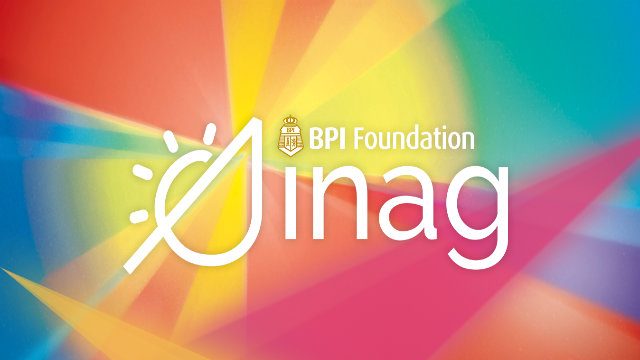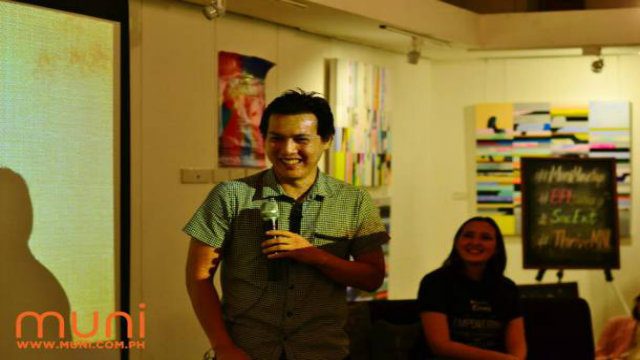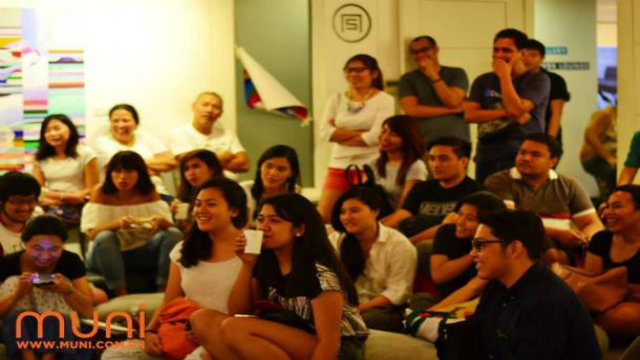SUMMARY
This is AI generated summarization, which may have errors. For context, always refer to the full article.

MANILA, Philippines – “Find a problem worth solving.”
This is what the Communications Officer of the BPI Foundation, Ebony Lautner, said to a crowd of would-be social entrepreneurs in a gathering dedicated to Filipino pride. The agenda on this Muni meetup, Cacao, Tea & Community, was to get people to start thinking about the possibilities of social change through business.
Kickstarting this same agenda through healthy competition is the BPI Sinag Challenge. Held by the BPI Foundation, the Ateneo Center for Social Entrepreneurship, and BPI Family Ka-Negosyo, BPI Sinag calls out to young entrepreneurs, challenging them to create businesses that “engage and uplift those at the bottom of the pyramid.” If you enter the challenge and win, you receive support in the form of cash prizes, finance and mentoring. Why this big effort to seek, support, and sustain? Lautner said the people behind BPI Sinag want to minimize the failures of enterprises that are designed to do good.
When you’re in a social enterprise, you’re not only in the business of creating a product and making a profit – you’re in the business of trying to improve the quality of people’s lives and building the blocks towards change. Unsurprisingly, the two don’t always go hand in hand, thus BPI Sinag.
At the launch of BPI Sinag, Rudy Ang, the dean of the John Gokongwei School of Management at Ateneo de Manila University, defined social enterprises as businesses “that can provide access to resources that can improve the quality of life of the poor in an affordable way.” He added that a danger for social entrepreneurs is scaling up, or rather, not scaling up. How do you help people if you don’t grow? More importantly, how do you grow?
Two social entrepreneurs at the July 4 Muni meetup answered this burning question by sharing their own experiences of hardship, success, and doing good. If you’re thinking about joining the BPI Sinag challenge, or simply have an idea for a good business with social impact, their stories might just be the push you need.
“Find an idea you believe in.”

Rob Crisostomo, founder of Seed Core Enterprises and general manager of Casco Commodities, an exporter of Philippine cacao to the world, believes that the key is in faith.
Rob and his wife, Bea, started out as entrepreneurs running Ritual, a general store that advocated organic food, green living, and environmental sustainability. From being cacao lovers to finding an environment to grow cacao in Davao, one thing led to another and eventually Rob found himself supplying cacao to Barry Callebaut, the world’s largest supplier of high quality chocolate.
Rob calls himself “lucky.” But at the same time, his drive for business was fueled by his strong belief that now, of all times, we need to start looking at the environment as a responsibility. With the Muni community Rob shared that a problem he feels strongly about in the country is deforestation, mining, and environmental degradation.
How does one solve this problem?
“The reason why we set that system up is because tree-planting activities are normally failed activities in the Philippines. They’re usually for photo-ops; nobody really takes care of the trees. By planting fruit trees or marketable fruit crops, people have a strong incentive to maintain their trees because they’ll earn from them within 3 to 5 years,” Rob said.
The people he talked about then are the farmers he works with now. Through the export of cacao, poor farmers get to earn from their hard work in their lifetime. At the same time, looking at it from a larger perspective, it’s the community that protects the environment.
As he told his story, Rob continued to share more of what’s brought him to where he is now. He emphasized that “business is survival.” If that’s the case, then it makes sense to go into it only with the utmost belief that what you’re doing is worth it.

With money or without, work hard and work wisely: a nugget of hard-earned advice from Jamir Ocampo of Tsaa Laya. Why did he persevere? Because the urban poor women living in Calauan, Laguna were depending on him.
Tsaa Laya is a social enterprise that produces premium tea collections that are uniquely Filipino, using local herbs, fruits, and spices. Aside from being the fruit of our soil, the teas are also the proud work of women who were moved from their homes in Manila to Calauan, Laguna so that could resettle after various typhoons and disasters.
“We eat risks for breakfast.” Jamir was referring to social entrepreneurs when he said this, but the same can be said for the women who work with him. As he observed, women are just as vulnerable, or even more so, when it comes to a lack of livelihood opportunities. Many end up staying with the family and depending on their husbands, whose work may not be regular either. Tsaa Laya gives them a skill, a product to invest in, and a market that appreciates their work.
When you’re in this situation, it becomes all the important to learn how to raise capital, and have the patience and the strength to persevere while you’re doing so. Raise capital, test the market, and learn to eat your breakfast with risks and bravery.
The aim is impact
How do you transform business profit into long-term social impact? How do you measure your social impact?
At the Muni meetup, these were the burning questions on people’s minds. In return, Rob and Jamir asked questions like, how do you measure long-term happiness? How many people do you have to help for you to say you have social impact? What are the intangible ways that social enterprise helps its constituents?
As they tell it, in social enterprise, there is no one formula and aside from the usual trial and error in businesses, it’s a lot of close communication with the community you’re working with.

Unsurprisingly, the people who asked these questions were young and wide-eyed millenials, exactly the type of people BPI Sinag is looking for. BPI Foundation executive director Fidelina Corcuera says they’re “seeking millennials, people who are as creative as they are critical thinkers, that have the passion and skills to change the world through business.”
If you’re looking for help in this trial and error process of making profit and impact, why not try joining BPI Sinag?
Applications can be sent on or before July 20, 2015, read more here. – Rappler.com
Dindin Reyes is a yoga instructor, teaching Vinyasa and Hatha classes. She graduated from a 200-hour RYT Vinyasa teacher training at White Space Mind and Body Wellness. As an instructor, she is passionate about teaching beginners and helping them find what yoga is for them. Dindin also writes about yoga, social enterprises and volunteering in the Philippines on thelargeworld.wordpress.com.
Add a comment
How does this make you feel?
There are no comments yet. Add your comment to start the conversation.